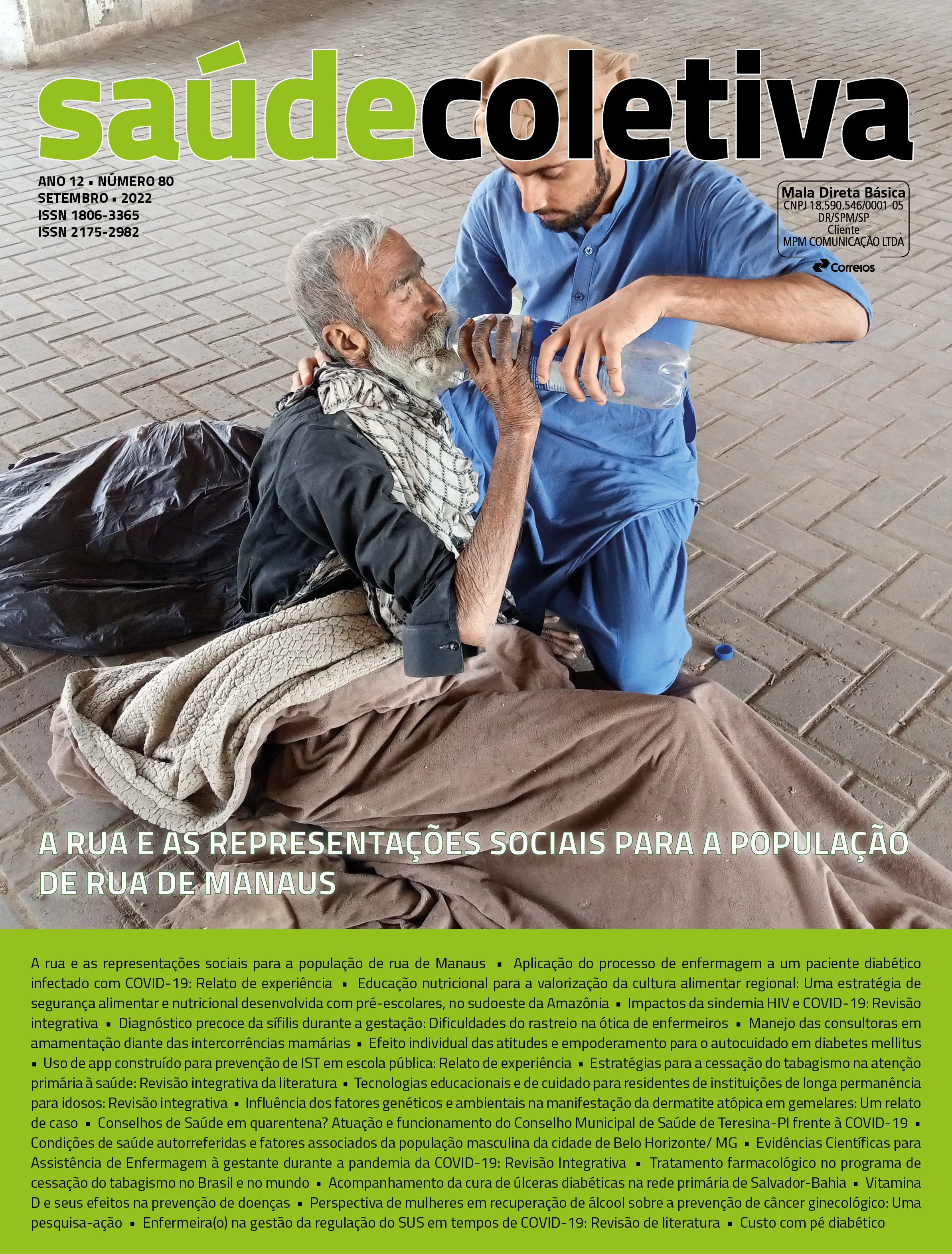Manejo das consultoras em amamentação diante das intercorrências mamárias
DOI:
https://doi.org/10.36489/saudecoletiva.2022v12i80p11290-11301Palavras-chave:
Consultores, Aleitamento materno, Doenças mamárias, Saúde da mulher, EnfermagemResumo
Objetivos: identificar as principais intercorrências mamárias atendidas pelas consultoras em amamentação e caracterizar as estratégias utilizadas pelas consultoras em amamentação para manejo das intercorrências mamárias. Métodos: estudo qualitativo, descritivo e exploratório, aprovado pelo Comitê de Ética em Pesquisa sob parecer nº 5.316.182 e CAAE 56316522.8.0000.5526, realizado com 10 consultoras em amamentação. A coleta de dados ocorreu através de um roteiro de entrevista semiestruturada com gravação na plataforma Google Meet. A análise dos dados deu-se pela técnica de conteúdo temática proposta por Bardin. Resultados: As principais intercorrências mamárias atendidas pelas consultoras foram a fissura mamilar, o ingurgitamento patológico, os abscessos e a obstrução de ductos. As estratégias de manejo utilizadas foram orientações com base em evidências, uso da laserterapia, massagem, ordenha e estímulo para participação da rede de apoio. Conclusão: É fundamental educação permanente para as consultoras em amamentação de modo que reduzam o desmame precoce, através de suas ações.
Referências
Fundação Oswaldo Cruz. Questões de amamentação. 2020. Rede Global de Banco de Leite Humano (rBLH)/FIOCRUZ. Disponível em: https://rblh.fiocruz.br/questoes-de-amamentacao.
Luz LS, Minamisava R, Scochi CGS, Salge AKM, Ribeiro LM, Castral TC et al. Fatores preditivos da interrupção de aleitamento materno exclusivo em prematuros: coorte prospectiva. Rev. bras. enferm. 2018; 71(6): 2876-82. Disponível em: https://www.scielo.br/pdf/reben/v71n6/pt_0034-7167-reben-71-06-2876.pdf.
Rodrigues GMM, Ferreira ES, Neri DT, Rodrigues DP, Farias JR, Araújo YIS et al. Desafios Apresentados por Primíparas Frente ao Processo de Amamentação. Nursing. 2021; 24(281): 6271-5. Disponível em: <http://revistas.mpmcomunicacao.com.br/index.php/revistanursing/article/view/1965/2387>.
Dias JS, Vieira TO, Vieira GO. Fatores associados ao trauma mamilar no período lactacional: Uma revisão sistemática. Rev. bras. saúde mater. infant. 2017; 17(1): 43-58. Disponível em: https://www.scielo.br/j/rbsmi/a/xRRqKBnsWXYmnfLjzvXsmcr/?lang=pt#:~:text=Os%20fatores%20associados%20ao%20trauma%20mamilar%20relatados%20em%20dois%20ou,do%20lactente%20ao%20seio%20materno.
Anderson L, Kynoch K, Kildea S, Lee N et al. Effectiveness of breast massage for the treatment of women with breastfeeding problems: a systematic review. JBI Database System Rev Implement Rep. 2019; 17(8): 1668-94. Disponível em: <https://pubmed.ncbi.nlm.nih.gov/31135656/>.
Brasil. Ministério da Saúde. Leite materno: índices de amamentação crescem no Brasil, 2020. Disponível em: https://www.gov.br/casacivil/pt-br/assuntos/noticias/2020/agosto/leite-materno-indices-de-amamentacao-crescem-no-brasil.
Govani L, Ricchi A, Molinazzi MT, Galli MC, Putignano C, Artioli G, Foá C, Palmieri E, Neri I et al. Breastfeeding pathologies: analysis of prevalence, risk and protective factors. Acta Biomed for Health Professions. 2019; 90(4): 56-62. Disponível em: https://www.ncbi.nlm.nih.gov/pmc/articles/PMC6625556/.
Mussi RFF, Mussi LMPT, Assunção ETC, Nunes CP et al. Pesquisa Quantitativa e/ou Qualitativa: distanciamentos, aproximações e possibilidades. Rev SUSTINERE. 2019; 7(2): 414-30. Disponível em: https://www.e-publicacoes.uerj.br/index.php/sustinere/article/view/41193.
Costa BRL. Bola de Neve Virtual: O Uso das Redes Sociais Virtuais no Processo de Coleta de Dados de uma Pesquisa Científica. Rev interdisciplinar de gestão social. 2018; 7(1): 1-23. Disponível em: https://periodicos.ufba.br/index.php/rigs/article/view/24649/16131.
Bardin, L. Análise de Conteúdo. São Paulo: Edições 70; 2016.
Morais TCEV, Souza TO, Vieira GO, Júnior JB, Jesus GM. Técnica de amamentar e a incidência de traumas mamilares em puérperas atendidas em um hospital municipal: estudo de intervenção. Rev. bras. saude mater. infant. 2020; 20(3): 705-14. Disponível em: https://www.scielo.br/scielo.php?pid=S1519-38292020000300695&script=sci_arttext& tlng=pt. DOI: https://doi.org/10.1590/1806- 93042020000300003.
Soares BKP, Barreto RAR, Feitoza IBL, Lopes AD, Silva ITS, Souza FMLC et al. Application of laser therapy in the treatment of nipple traumas: a literature review. Online Braz J Nurs. 2021; 20(e20216508). Disponível em: http://www.objnursing.uff.br/index.php/nursing/article/view/6508/pdf-pt.
Lima APC, Nascimento DS, Martins MMF. A prática do aleitamento materno e os fatores que levam ao desmame precoce: uma revisão integrativa. J Health Biol Sci. 2018; 6(2): 189-96. Disponível em: file:///C:/Users/bibi_/Downloads/1633-6961-1-PB.pdf. DOI: https://doi:10.12662/2317-3076jhbs.v6i2.1633.p.189-196.2018. 14.Cunha AMS, Martins VE, Lourdes ML, Paschoini MC, Parreira BDM, Ruiz MT. Prevalence of nipple traumas and related factors among post-partum women assisted in a teaching hospital. Esc Anna Nery. 2019; 23(4): 1-8. Disponível em: <https://www.scielo.br/scielo.php?pid=S14 14- 81452019000400203&script=sci_arttext>. DOI: https://doi.org/10.1590/2177-9465- ean-2019-0024.
Martins ACM, Kinalski DDF, Moraes FE, Grendene RGM, Vescovi G et al. Telecondutas Aleitamento Materno. 2020; Disponível em: .
Brasil. Ministério da Saúde. Secretaria de Atenção à Saúde. Departamento de Atenção Básica. Saúde da criança: aleitamento materno e alimentação complementar. Brasília (DF): Ministério da Saúde. 2015; 23(2): 53-65. Disponível em: <https://bvsms.saude.gov.br/bvs/publicacoes/saude_crianca_aleitamento_materno_cab23.pdf>.
Heise AM, Wiessinger D. Dysphoric milk ejection reflex: A case report. Int Breastfeed Journal. 2011; 6(6): 2-7. Disponível em: <https://doi.org/10.1186/1746-4358-6-6>.
Oriá MOB, Dodou HD, Chaves AFL, Santos LMDA, Ximenes LB, Vasconcelos CTM et al. Effectiveness of educational interventions conducted by telefone to promote breastfeeding: a systematic review of the literature. Rev. Esc. Enferm. USP. 2018; 52(e03333). Disponível em: <https://www.scielo.br/j/reeusp/a/QQwMnDtyzRq68kKxnmKBKMh/abstract/?lang=pt>.
Rodrigues AS, Oliveira JF, Suto CSS, Coutinho MLP, Paiva MS, Souza SS et al. Care for women involved with drugs: social representations of nurses. Rev Bras Enferm. 2017; 70(1): 71-8. DOI: http://dx.doi.org/10.1590/0034-7167-2016-0339.
Patel S, Patel S. The Effectiveness of Lactation Consultants and Lactation Counselors on Breastfeeding Outcomes. J Hum Lact. 2016; 32(3): 530-41. Disponivel em: https://journals.sagepub. com/doi/10.1177/0890334415618668.
Chaves AFL, Vitoriano LNH, Borges FLP, Melo RDA, Oliveira MG, Lima ACMACCL et al. Percepção das mulheres que receberam consultoria em amamentação. Enferm. Foco. 2019; 10(5): 79-84. Disponível em: <http://revista.cofen.gov.br/index.php/enfermagem/article/view/2519>.







